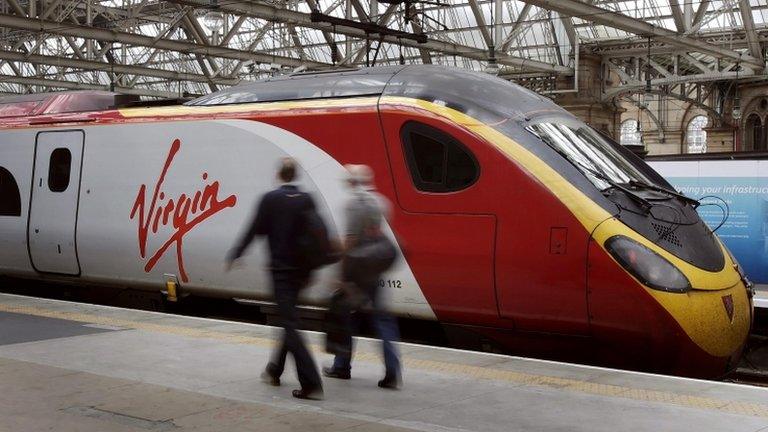What derailed the Transport Department
- Published
- comments

Sir Richard Branson's Virgin fought the Department's decision to award the franchise to First Group
In awarding a contract to run a public service, such as a railway, there is a balance to be struck between making the contract long enough to encourage serious investment and not so long that the forecasts built into bids for the contract become highly speculative.
What the Department for Transport appears to have got chronically wrong in the case of the West Coast Main Line franchise is its assessment of the risk that attaches to projections by bidders of revenues in the latter years of the 15-year franchise.
To put it in terms that we can all understand, if I expect to earn a pound from my work tomorrow, that pound is much more likely to materialise than a pound that I might expect to earn in 2025 (if anyone will still employ me then).
By extension, when First Group and Virgin made their bids to run the line that connects London with Manchester and Glasgow, it would have been reasonable to expect the Department for Transport to put a much greater weight on revenues the companies expect to generate in the first five to ten years than in the latter five years.
However the Department seems to have understated the long-term risks when awarding the contract to First Group.
Or to put it another way, the Department made unrealistic assumptions about the growth of passenger numbers and inflation towards the back end of the franchise period - which had the effect of making First Group's bid seem significantly more attractive, because First Group was massively more optimistic about how passengers and revenues could grow after 2021 than was Virgin.
This error seems to have occurred both when Virgin was eliminated from the bidding contest, and when First Group's bid was reassessed against the Department's own forecasting model for future revenues.
The basic point is that although there are powerful arguments for awarding longer term contracts, so that the successful bidder has an incentive to spend serious money on the best kit, a healthy scepticism needs to be attached to forecasts of the health of the economy and of the relevant public service over a time period as long as three parliaments.
Without such healthy scepticism, the government would tend to demand too little in the way of guaranteed money for taxpayers from bidders who are particularly optimistic about long-term prospects.
UPDATE 16:20 BST
Rarely if ever in the history of private provision of public services has there been such a bungle by Whitehall in the awarding of a highly valuable and important contract.
There appear to have been two giant errors by the Department for Transport in the way it adjudicated on who should receive the 15 year contract to run the West Coast Main Line.
First it unfairly discriminated against the incumbent, Virgin, by attaching far too great a probability to the projections by the rival bidder First Group that its revenues in the later years of the contract would be much bigger than Virgin's.
This mistake was compounded in the department's own internal forecasting model, which also attached too little risk to the possibility that passenger numbers and inflation would be significantly different from what First Group was projecting after 2021.
As a result, the government demanded too little guaranteed money for taxpayers from First Group.
But perhaps all this can be forgiven as an unfortunate technical error. What is perhaps more shocking is that Virgin has been complaining about the flaws in the bidding process for months, and yet the government pressed on with awarding the contract to First Group.
It was only after Virgin demanded a judicial review - after it sued - that the department was forced to acknowledge that it had made an egregious error.
Junior heads may now roll - in that three department officials have been suspended. But some would say that it is incumbent on the permanent secretary, Philip Rutnam, and the previous transport secretary, Justine Greening - reshuffled out only last month - to explain how they came so close to awarding a contract worth around £5bn on such a flawed basis.
- Published15 October 2012

- Published3 October 2012
